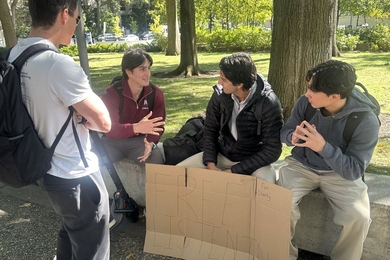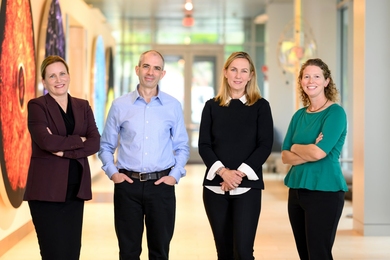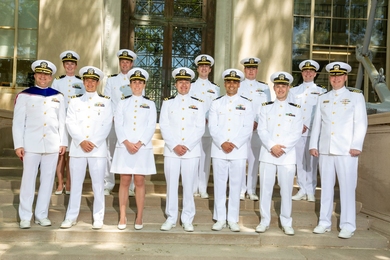(Following is President Charles M. Vest's Charge to the Graduates at Commencement exercises on Friday, June 6. He began his remarks, which are excerpted below, in response to presentation of the 1997 senior class gift-a new SPICE fund [Students Promoting an Improved College Experience]-by Pardis Sabeti, president of the Class of 1997).
Thank you, Ms. Sabeti. It is a moving experience to receive a gift from the class at a moment like this--after all we've put you through! This fund will stand as a lasting tribute to the spirit of the Class of 1997. It comes at an especially appropriate moment--as we take a fresh look at how to improve the living and learning experience for all of our students. I know your vision and generosity as a class will serve as a model for those who follow you. Thank you very much.
Before issuing my charge to the graduating class, I would like to note that this is a graduation of sorts for another person here on this stage. the person who is presiding over Commencement for the last time today. I refer, of course, to the Chairman of the MIT Corporation, Paul Edward Gray.
Paul is completing his service as chairman this July, and after a bit of time off for good behavior, he will return to what he has always and consistently called the best job at MIT--that of being a professor. With his lifetime of service to and leadership of the Institute, I consider Paul Gray to be the very personification of MIT. in his integrity, his caring, and his insistence on recognizing and rewarding excellence, wherever it is found.
As the one who is fortunate and privileged to follow in his presidential footsteps, I count no privilege of my office higher than that of having Paul as a counselor, guide and friend. Paul, together with his wife Priscilla, who is also with us today, have blessed this place. Now it is our turn to thank them.
Living at this particular moment in history, you may be tired of the predictable onslaught of statements about the Twenty-First Century, the New Millennium, and the Year 2000. Thus, I will desist from using those particular rhetorical flourishes. Nonetheless, I do believe that as graduates, you will play out your personal and professional lives in an era that will be very different from that which your parents and most of us here on the platform have experienced.
THREE AREAS OF DIFFERENCE
The differences, I believe, will largely be derived from three forces: science and technology, internationalization and changing demography. Thus, as graduates of MIT, you will have unusual responsibilities--and opportunities--because these forces have been integral to your education here.
This morning, I would like you to consider your professional and social responsibility in a world that is undergoing profound shifts--not the least of which is a shift in what seems to be a rebalancing of the roles traditionally held by the public and private sectors of our society.
What do I mean by rebalancing the roles of the private and public sectors? Most of us would recognize that two major themes of the current decade are competitiveness and privatization. There is less trust in governments, and more trust in business and market efficiency. Central planning has generally been found to be a failure, and entrepreneurial activity is increasingly valued. As both parties in the United States Congress and the administration pledge to balance the federal budget, many long-standing programs will be reduced or eliminated.
These shifts from public to private sector hold, I believe, many implications, one of which is a realignment of social responsibilities. Increasingly, industry will be called on to address issues of common good that extend beyond the traditional principles of market-driven efficiency and shareholder value. And you will be charged with seeing this through.
Let me suggest three areas in which these changing circumstances will offer you both greater opportunity and increasing personal responsibility. The first is creating and sharing scientific and technical knowledge for the greater good. The second is exercising responsibility for our natural environment, and the third is addressing the problems and opportunities of a changing population--in America and elsewhere.
SHARING KNOWLEDGE
First, some comments about creating and sharing scientific and technological knowledge: Our nation and world today are the beneficiaries of an unprecedented reservoir of knowledge about science and technology. This reservoir has been developed and continually replenished largely by two sources: government-supported university research, and research conducted in corporate laboratories. Federal support of university research is waning, and indeed is in danger of falling well below its necessary minimum level. And in recent years, corporate research has largely been refocused on shorter-term, often proprietary, development. This is understandable in the current competitive climate, but is likely to contribute less and less to the common base of knowledge that is shared broadly with other organizations, companies, academia and federal agencies.
The importance of this shared base of knowledge was dramatically highlighted last month by a study of patents issued by corporations worldwide. It was found that over 75 percent of the scientific literature cited in patents come from so-called public science--that is, from government-sponsored research, mostly conducted at universities. Thus, the line between public and private responsibilities in science and technology is far from distinct to begin with, and it is changing.
What does this have to do with you?
Let me suggest that as you pursue your careers and undertake your roles as citizens and officials, you must strive to promote the development of new knowledge and to find ways to ensure that it is shared for the benefit and advancement of all.
ENVIRONMENTAL FOCUS
The second area in which you will have both increased responsibility and opportunity is the environment. For the past 30 years or so, environmental concerns in this country have been dominated by a mentality of government regulation and remediation. At its best, this has dramatically improved our health and quality of life, but at its worst, it has led to unreasonable legalistic resolutions, and priorities being set without sound scientific bases.
I believe that in the future, industry and academia must play an increasingly important role in exercising environmental responsibility. We at MIT are working hard--and many of you have been part of this effort--to establish this new paradigm by educating engineers, managers, scientists, economists and policy experts to analyze environmental issues and to synthesize sound solutions. This does not mean just that we need to educate more environmental experts. More importantly, it means that sound thinking about, and commitment to, sustainable development and environmental stewardship must be an integral part of the general education and practice of engineering and management in particular.
This approach will, I believe, be welcome in the corporate world, which is finding increasingly that sound and proactive environmentalism in fact is good business. The growing commitment to a healthy environment on the part of both industry and academia is setting the stage for new partnerships between the public and private sectors.
Take, for example, the Montreal Protocols on the reduction of CFCs in the atmosphere, undertaken in order to halt the damage to the earth's protective ozone layer. These protocols are based on the fundamental scientific work of MIT's Nobel laureate and Institute Professor Mario Molina and his colleagues. It is an agreement that rests not only on sound science, but on determined and thoughtful work across complicated political and geographic boundaries to ensure that all the citizens of the world benefit, whether they reside in rich nations or poor.
As you pursue your careers and undertake your roles as citizens and officials, I urge you to emulate Professor Molina's example--and bring both sound science and effective environmental stewardship to the worlds of industry and policy.
CHANGING FACE OF AMERICA
The final area I wish to address is the one in which you will face both increased challenge and responsibility; it has to do with addressing the problems and opportunities of a changing American population.
Colleges and universities have acted on this challenge, in part, by enrolling bright, motivated students from diverse geographic, economic, cultural, racial and experiential backgrounds.
We have done so because of our conviction--born of practical experience--that this diversity makes good educational sense. Students learn by encountering new ideas and new people--not by reaffirming what they already know.
We have done so because of a conviction deeply rooted in the American psyche--a conviction that education is the most important factor in enabling people to earn their place in the world.
And we have done so because it is our responsibility to educate all of those who will contribute to our society's well-being.
Why, then, are so many of our universities being denied the tools to ensure access to minority students? Over the past several years, programs that promote diversity and opportunity in higher education have been dealt serious blows by government, the judiciary, by some of the voting public and by some university governing boards.
Last year's repeal of all affirmative action by the University of California's Board of Regents, and by the federal court decision prohibiting any consideration of race or ethnicity in admissions by the University of Texas's Law School are having chilling effects. If anyone doubts the negative consequences of such actions, please consider this: the number of African-American and Latino students in the University of California has dropped precipitously this year, and the number of black students entering the University of Texas Law School this fall, according to The New York Times, will be exactly zero.
This is a deeply troubling phenomenon in a society still wrestling with the lingering curse of racial division. We still have far to go until we become a nation fully integrated and fully committed at every level and in every aspect. Whatever your views on how we reach that goal, reach it we must. We look to you as citizens and leaders to create effective ways to do so.
CHARGE TO GRADUATES
As I leave you today with a simple charge, I'd like to quote the great philosopher Woody Allen: "I don't want to achieve immortality through my work; I want to achieve it by not dying."
Take your education, your talent and your energy, and build us a nation and a world community that consider knowledge a gift to be shared, a healthy planet a place to be cherished, and human dignity and opportunity fundamental conditions to be enjoyed by all people.
Men and women of MIT, I wish you Godspeed and great good fortune.
A version of this article appeared in MIT Tech Talk on June 11, 1997.





